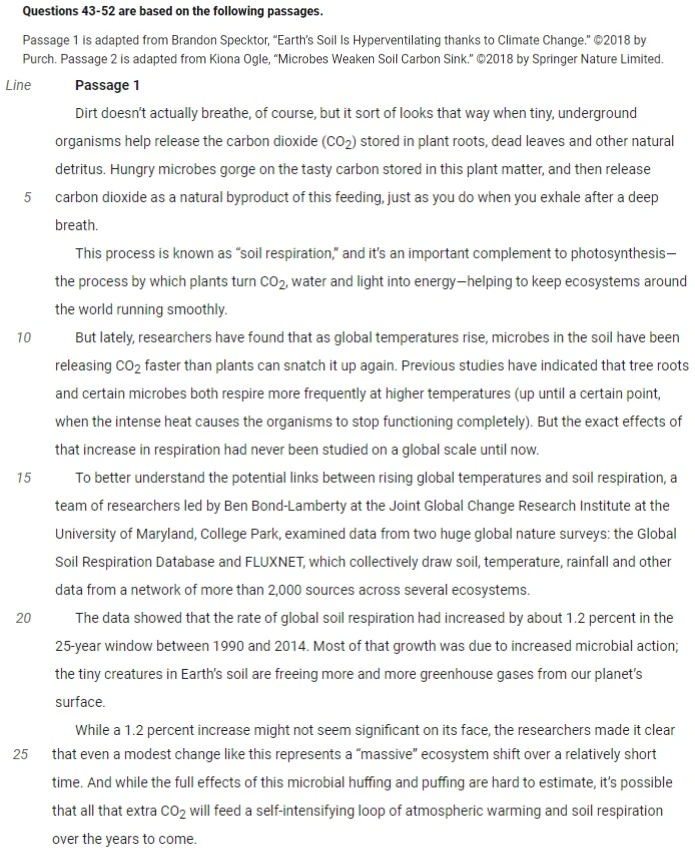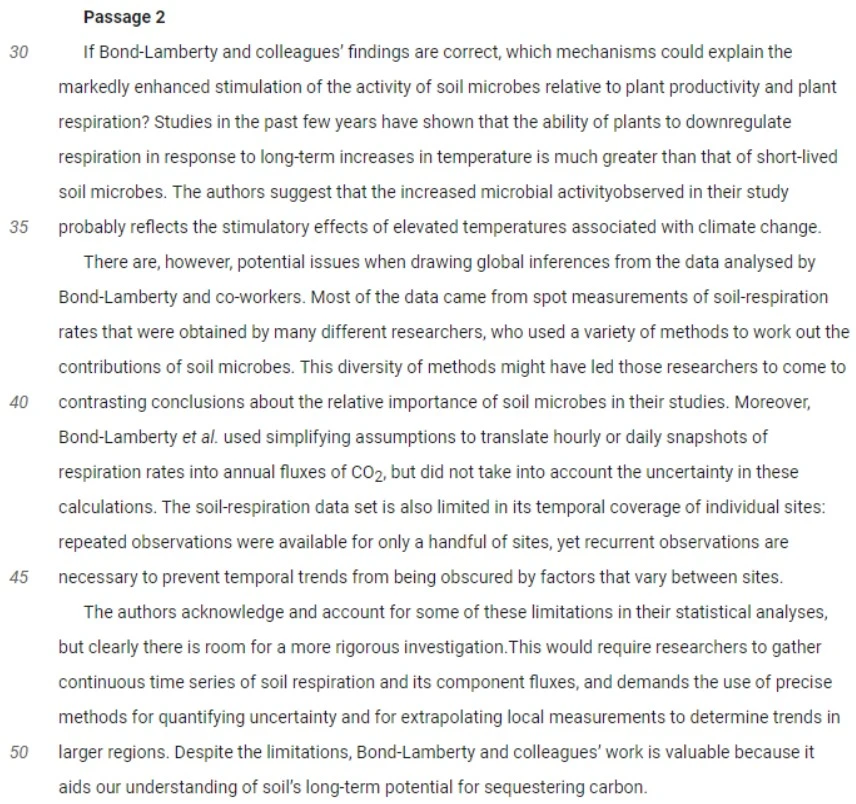Section: Reading and Writing 0 Likes
Dirt doesn't actually breathe, of course, but is sort of looks - SAT (May 2023 U.S.)


Questions from the passage
43) Over the course of Passage 1, the main focus shifts from
A. an explanation of a process to a discussion of research aimed at exploring how global temperature increases may affect that process.
B. a hypothesis about how global temperatures drive a process to a study designed to test that hypothesis.
C. a presentation of two sides of a debate about the effects of global temperature on a process to a summary of evidence in support of one side of that debate.
D. a review of previous research regarding the gradual development of a process to a consideration of the future implications of sudden changes to that process.
44) Which choice from Passage 1 best supports the idea that certain organisms cannot survive in extreme environmental conditions?
A. line 2-4 (“Dirt . . . detritus”)
B. line 4-6 (“Hungry . . . breath”)
C. line 11-13 (“Previous . . . completely”)
D. line 13-14 (“But . . . now”)
45) Passage 1 indicates that the balance observed in the typical relationship between soil respiration and photosynthesis
A. increases the amount of carbon dioxide that is released into the air.
B. depends primarily on the number of microbes that survive in soil.
C. is necessary to stabilize sudden instances of dangerously severe weather patterns.
D. has been disrupted by an overall rise in global temperatures.
46) The first paragraph of Passage 2 (line 30-35) mainly serves to
A. acknowledge an important discovery that will be contextualized in the passage.
B. summarize an assumption that will be elaborated on in the passage.
C. discuss the conclusions of a study that will be analyzed in the passage.
D. emphasize a lack of consensus that will be ultimately reconciled in the passage.
47) As used in line 34, “observed” most nearly means
A. remembered.
B. preserved.
C. attended.
D. detected.
48) As used in line 41, “translate” most nearly means
A. convert.
B. define.
C. explain.
D. reword.
49) Which choice best states the relationship between the passages?
A. Passage 2 underscores the importance of the research conducted in Passage 1.
B. Passage 2 echoes a concern put forth by the researchers featured in Passage 1.
C. Passage 2 offers an alternative explanation for the findings presented in Passage 1.
D. Passage 2 raises doubts about the accuracy of the conclusions described in Passage 1.
50) It can reasonably be inferred from Passage 2 that its author considers the “2,000 sources across several ecosystems” noted in line 19, Passage 1 to
A. demonstrate a clear point of comparison between local and global data.
B. provide evidence that has been later proved by scientists to be unreliable.
C. represent a major advance over all previous studies of soil respiration.
D. reflect different experimental approaches that are not necessarily consistent with one another.
51) Which choice from Passage 2 provides the best evidence for the answer to the previous question?
A. line 36-37 (“There . . . co-workers”)
B. line 39-40 (“This . . . studies”)
C. line 40-43 (“Moreover . . . calculations”)
D. line 50-51 (“Despite . . . carbon”)
52) The author of Passage 1 would likely consider the statement in line 34-35, Passage 2 (“The authors . . . change”) to be
A. an accurate summary of Bond-Lamberty and colleagues’ conclusions regarding an environmental process.
B. a logical interpretation of Bond-Lamberty and colleagues’ analysis of microbial life spans.
C. a general reflection of Bond-Lamberty and colleagues’ investigation concerning carbon storage.
D. an objective review of Bond-Lamberty and colleagues’ research into atmospheric conditions.
Solution
Correct answer:
43 - A
44 - C
45 - D
46 - C
47 - D
48 - A
49 - D
50 - D
51 - B
52 - A
Exam Edition: May 2023 U.S.
Exam Year: 2023
Related topics: Environmental Processes and Climate Change, Textual Comprehension, Analysis and Interpretation of Information